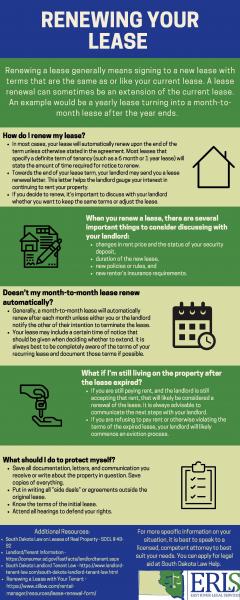Landlord-Tenant - Renewing your lease
Renewing a lease generally means signing to a new lease with terms that are the same as or like your current lease. A lease renewal can sometimes be an extension of the current lease. An example would be a yearly lease turning into a month-to-month lease after the year ends.
How do I renew my lease?
-
In most cases, your lease will automatically renew upon the end of the term unless otherwise stated in the agreement. Most leases that specify a definite term of tenancy (such as a 6 month or 1 year lease) will state the amount of time required for notice to renew.
-
Towards the end of your lease term, your landlord may send you a lease renewal letter. This letter helps the landlord gauge your interest in continuing to rent your property.
-
If you decide to renew, it’s important to discuss with your landlord whether you want to keep the same terms or adjust the lease.
Important things to consider discussing with your landlord are:
-
changes in rent price and the status of your security deposit,
-
duration of the new lease,
-
new policies or rules, and
-
new renter’s insurance requirements.
Doesn’t my month-to-month lease renew automatically?
-
Generally, a month-to-month lease will automatically renew after each month unless either you or the landlord notify the other of their intention to terminate the lease.
-
Your lease may include a certain time of notice that should be given when deciding whether to extend. It is always best to be completely aware of the terms of your recurring lease and document those terms if possible.
What if I’m still living on the property after the lease expired?
-
If you are still paying rent, and the landlord is still accepting that rent, that will likely be considered a renewal of the lease. It is always advisable to communicate the next steps with your landlord.
-
If you are refusing to pay rent or otherwise violating the terms of the expired lease, your landlord will likely commence an eviction process.
What should I do to protect myself?
-
Save all documentation, letters, and communication you receive or write about the property in question. Save copies of everything.
-
Put in writing all “side deals” or agreements outside the original lease.
-
Know the terms of the initial lease.
-
Attend all hearings to defend your rights.
For more specific information on your situation, it is best to speak to a licensed, competent attorney to best suit your needs. You can apply for legal aid at South Dakota Law Help.
Additional Resources
South Dakota Law on Leases of Real Property - SDCL § 43-32
Landlord/Tenant Information - South Dakota Consumer Protection
South Dakota Landlord Tenant Law - Landlord Tenant Law
Renewing a Lease with Your Tenant - Zillow Rentals Resource Center
